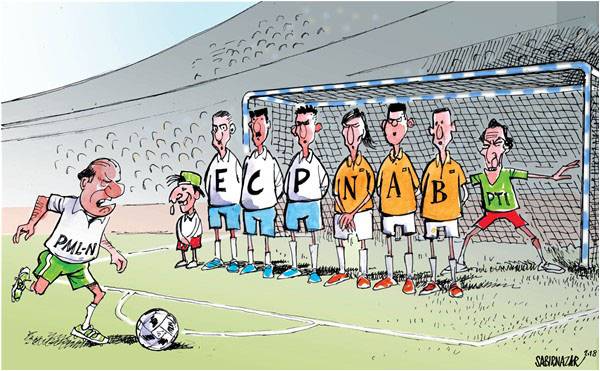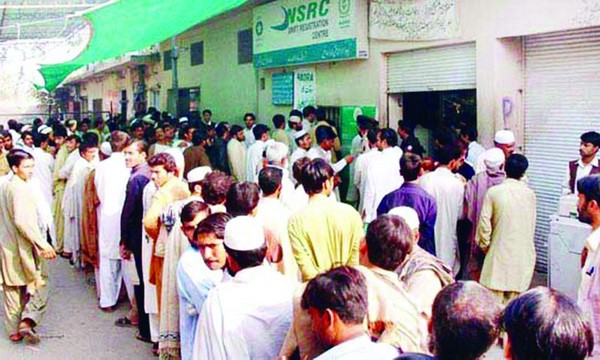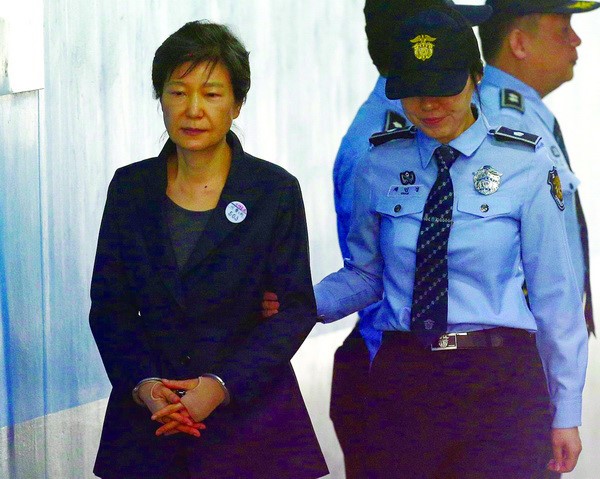

NADRA in Karachi
Madam,
Everyone knows that Karachi has a huge number of residents. Unfortunately, there is no proper management of National Database Registration Authority offices, where scores of citizens come from far away to get their identity documentation. In North Nazimabad, there are no facilities for visitors to sit as they wait at the NADRA office. Many people are found sitting on the floor. Recently, NADRA also shut down several of its executive registration centres in Karachi and residents of Pak Colony, Taimuria, Soldier Bazaar, North Karachi, Keamari, Ittehad Commercial and Baldia Town are all suffering. Elections are coming up and if NADRA centers continue to function as they are, many people will lose their right to vote.
I humble request relevant authorities to look into this issue and improve NADRA’s management in Karachi.
Adnan Dost,
Karachi.

Wrong questions
Madam,
The Combined Competitive Examination 2018 (CCE-18) was conducted by the Sindh Public Service Commission for recruitment in various government departments. In this regard, an initial screening test was conducted in Sukkur and Larkana on June 24, 2018.
At first, we were told that there will be no negative marking and that we would get an exam of 100 questions. Then, a few days before the test, a new notification was issued, that exam will have 50 questions with negative marking of 0.5 per question. This made the paper quite tough. Strangely, even though this exam has been conducted for years, this year’s paper had so many blunders that many candidates feel they did badly only because they were confused by the questions. Among the many multiple-choice questions given in the test, correct answers were not included in the options. For instance, the question about the longest serving Samma ruler did not include the right answer - Jam Nizamuddin II - in the options, In another question, we had to fill the blank, “He walks….road.” Both “along” and “on” were given. In another question, candidates were asked to select the appropriate word “that is opposite in meaning to auspicious.” The options available were: a) successful b) luckless c) confinement and d) despair.
There was great discussion among candidates who argued that both ‘b’ and ‘d’ seem were correct. Some argued that ‘b’ was the only correct option while others said ‘d’ was closer to auspicious.
Another question we were asked to answer was the name of the famous ruler who came to Sindh during 1540-41 and later went to Iran. Options given to us included Humayun, Jehangir, Shah Jahan and Shah Alam
In the key, the correct answer is Humayun.
But Iran is invalid because Humayun went to Afghanistan. The basis of the question is incorrect because some books say he went to Afghanistan and others say he went to Iran. Students who have read about his visit to Afghanistan will be confused.
Another question which confused all was: When a constant force is applied to a body it moves with constant: a) momentum b) velocity c) speed or d) acceleration.
According to the second law of motion, F=ma, the answer is d) acceleration but this was not the answer given in the key.
These mistakes did not seem to have been rectified in another screening test held in Karachi on July 1. At least three questions were observed with wrong keys.
It is important that the paper is thoroughly checked before it is handed over to candidates. Looking at previous SPSC screening tests, there are numerous incorrect questions. Though the SPSC has now the reduced pass marks to 40 from 50, the commission must also adjust the candidates’ marks for the mistakes in the questions.
Mir Taqi Abbas Talpur,
Via email.
Sentencing of the South Korean president
Madam,
People of Pakistan wonder why their country has been left behind by South Korea, which once looked to us as a role model. Countries develop when there is rule of law and across-the-board accountability. South Korea does not allow any citizen, who has pledged an oath of loyalty to another country, or owns undeclared assets, nor any tax evader to hold public office. It does not offer tax amnesty schemes, nor give multiple plots to civil bureaucracy.
South Korea has invested intensively in human resource development, with emphasis in fields of science, technology, economics and arts. It offers citizens quality health services and security of life and private property. There is strict censure on those holding any public office not to have any conflicts of interest.
It is only when people at the top obey rules that societies develop. Accountability must start from the top and trickle down, for democracy to function and deliver to people the fruits of progress. Former 66-year-old elected president of South Korea, Park Guen-hye, was removed from office on charges of corruption and sentenced to 24 years imprisonment and a fine of $16.8 million. The court convicted Park of abusing presidential powers and pressuring 18 business groups to donate to two foundations controlled by her longtime confidante Choi Soon-sil and taking $6.5 million bribes from Samsung for facilitating irregularities. She was also convicted for giving Choi access to official documents.
Dozens of high-profile government officials and business tycoons have been indicted and imprisoned. Samsung heir Lee was initially sentenced to five years, which was suspended later by court while Lotte chairman Shin is serving 2.5 year sentence.
Malik Tariq,
Lahore.

